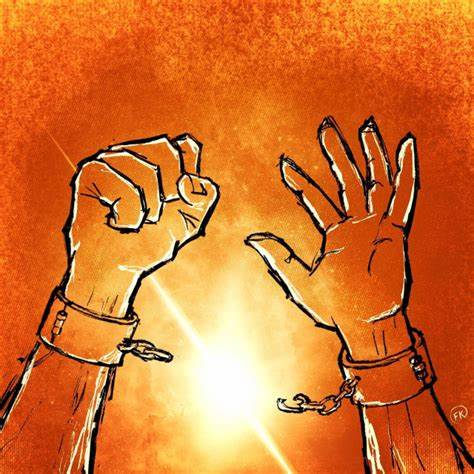THE SEED
“Is not this the kind of fasting I have chosen: to loose the chains of injustice and untie the cords of the yoke, to set the oppressed free and break every yoke?” Isaiah 58:6 NIV
Fasting and prayers, as highlighted in Isaiah 58:6, go beyond a mere ritual – they are a powerful proven means to break the strongholds in our lives. The verse explais to us the kind of fasting that God desires, is not just about abstaining from food but also about breaking the yoke of oppression. When we fast and pray, we can experience freedom from addictions, unhealthy habits, and burdens that have held us back. When we engage in fasting and prayers with a focus on overcoming strongholds as stated by Apostle Paul in 2 Corinthians 10:4 “The weapons we fight with are not the weapons of the world. On the contrary, they have divine power to demolish strongholds.” In these scriptures, we find a powerful strategy for overcoming the strongholds that may grip our lives. Fasting becomes a spiritual weapon, and prayer the way through which we bring down the strongholds with divine power. It’s not just about abstaining from food; it’s a deliberate, focused effort to break free from the things that hold us captive. As we embark on fasting and prayers, let’s do so with a clear purpose – to demolish strongholds, whether they be personal struggles, addictions, or injustices in our lives.
BIBLE READING: 2 Corinthians 10:3-6
PRAYER: Lord, as I fast and pray, empower my devotion to pull down and destroy every stronghold and yokes that hinder my spiritual and physical growth in Jesus name. Amen
AWE ATI ADURA, BIBORI AGBARA ESU
IRUGBIN NAA
“Irú ààwe tí mo ti yàn kọ́ nìyí: láti tú ewon àìṣòdodo àti láti tú okùn àjàgà, láti dá àwọn tí a ni lára síle, àti láti já gbogbo àjàgà?”Aísaya 58:6
Ààwe àti àdúrà, gẹ́gẹ́ bí a ti tẹnumọ́ nínú Isaiah 58:6, kọjá etò ìsìn lásán, wọ́n jẹ́ onà tí ó lágbára láti fọ́ àwọn ibi ààbò nínú ìgbésí ayé wa. Ẹsẹ náà ṣàlàyé irú ààwe tí Ọlọ́run fẹ́ fún wa, kì í ṣe nípa jíjáwọ́ nínú oúnjẹ nìkan ṣùgbọ́n nípa gige àjàgà ìnira pelú. Nígbà tí a bá gbààwe tí a sì ń gbàdúrà, a lè ní ìrírí òmìnira kúrò lọ́wọ́ àwọn iwa ti o soro ko sile, ìwà àìlera, àti àwọn ẹrù ìnira tí ó ti dá wa dúró. Nígbà tí a bá ń ṣe ààwe àti àdúrà pelú ìfojúsọ́nà lórí bíborí agbara esu gẹ́gẹ́ bí Àpọ́sítélì Pọ́olù ṣe sọ nínú 2 Kọ́ríńtì 10:4 : “Àwọn ohun ìjà tí a ń jà kì í ṣe ohun ìjà ayé. ” Nínú àwọn ìwé mímọ́ wonyí, a rí ọgbọ́n ìforowánilẹ́nuwò kan fún bíborí àwọn ibi agbára tí ó lè di ìgbé ayé wa mú. Ààwr di ohun ìjà trmí, àti àdúrà ní onà tí a fi ń sọ àwọn ibi ààbò re wále pelú agbára àtorunwá. Kì í ṣe nípa jíjáwọ́ nínú oúnjẹ nìkan; ó jẹ́ eto yiyan Lati gba Ara eni kuro lowọ awon ti o deni ní ìgbèkùn. Bí a ṣe ń bere ààwe àti àdúrà, ẹ jẹ́ kí a ṣe bẹ́e pelu ète tí ó ṣe kedere –láti wó àgbara esu,yálà wọ́n jẹ́ ìjàkadì ti ara ẹni, oun ti o soro kosile tàbí àìṣèdájọ́ òdodo nínú ìgbésí ayé wa.
BIBELI KIKA: 2 Kọ́ríńtì 10:3-6
ADURA: Oluwa, bi mo ti n gbawẹ ti mo n gbadura, fi agbara fun ifọkansin mi lati wó lulẹ ati pa gbogbo ibi agbara ati awọn ajaga ti o ṣe idiwọ idagbasoke ti ẹmi ati ti ara ni orukọ Jesu. Amin
